Mudi Dog Breed Information
The Mudi, a lesser-known breed outside its Hungarian roots, is a remarkable mix of smarts, adaptability, and lively energy among dogs. With its curly coat, this medium-sized herder hails from Hungary’s countryside, where it was a jack-of-all-trades on farms.
The Mudi is known for its agility and skill in herding, and it has become a jack-of-all-trades, shining in dog sports and obedience while also being a watchful friend. However, this breed isn’t as well-known as other herding dogs.
Understanding the Mudi’s history, looks, and behavior helps us appreciate this versatile breed and consider why some dog breeds become more popular.
Key Takeaways
- The Mudi excels in herding and agility.
- Originating from Hungary, it’s a multifaceted farm dog.
- Despite its abilities, the Mudi remains relatively obscure.
Quick Facts
The Mudi is a unique and skilled herding dog from Hungary, currently placed at 150th in popularity among the 200 breeds recognized by the American Kennel Club.
This breed is medium-sized, standing between 15 and 18.5 inches tall and weighing 18 and 29 pounds.
Mudis are known for their intelligence, versatility, and loyalty, making them invaluable to Hungarian farmers for various tasks. However, their plain looks can sometimes make them mistaken for a mixed breed.
They are adaptable to various living environments, including apartments, and have an easy-to-care-for coat suited for different weather conditions.
Owning a Mudi means committing to regular health check-ups, dental care, trimming their nails, and providing plenty of exercises to keep them physically and mentally fit.
Mudi Dog Breed Pictures
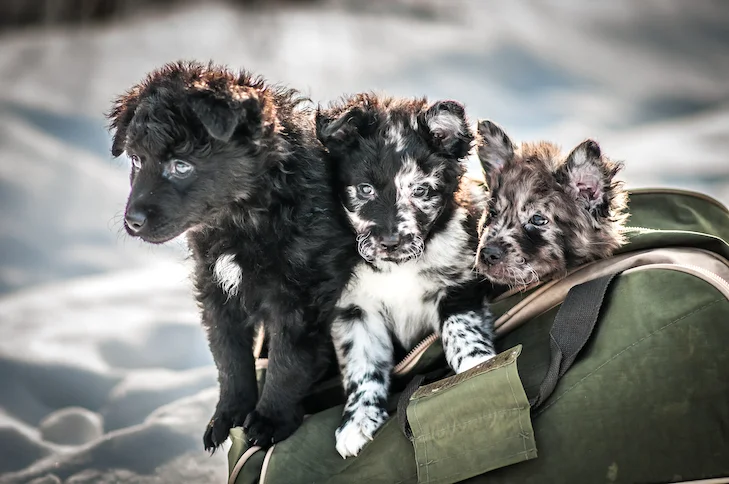
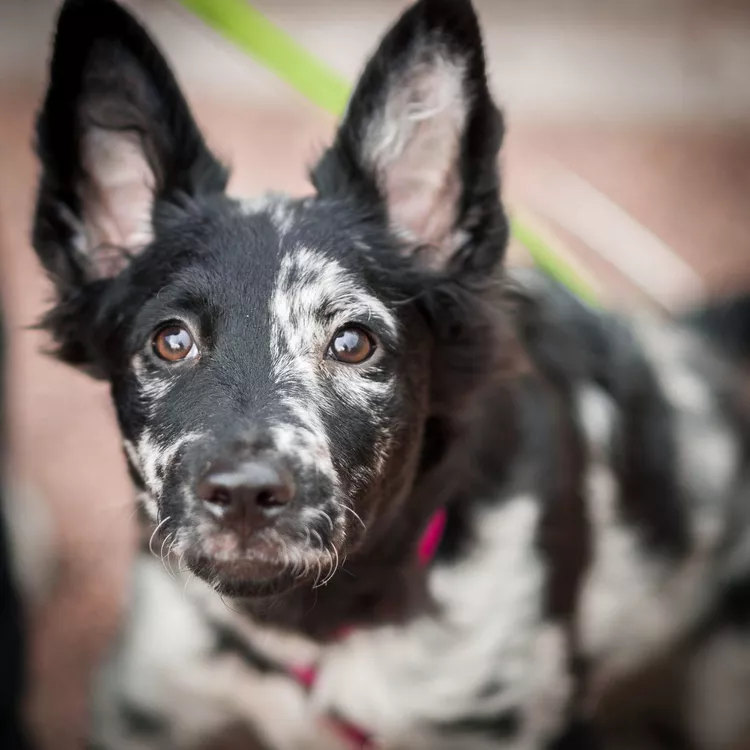
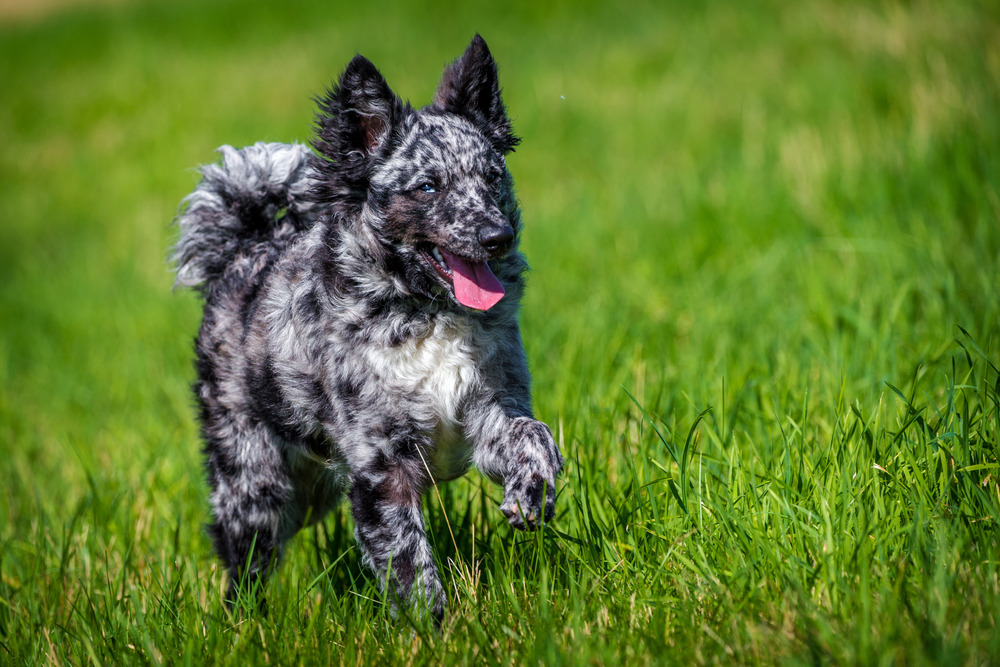
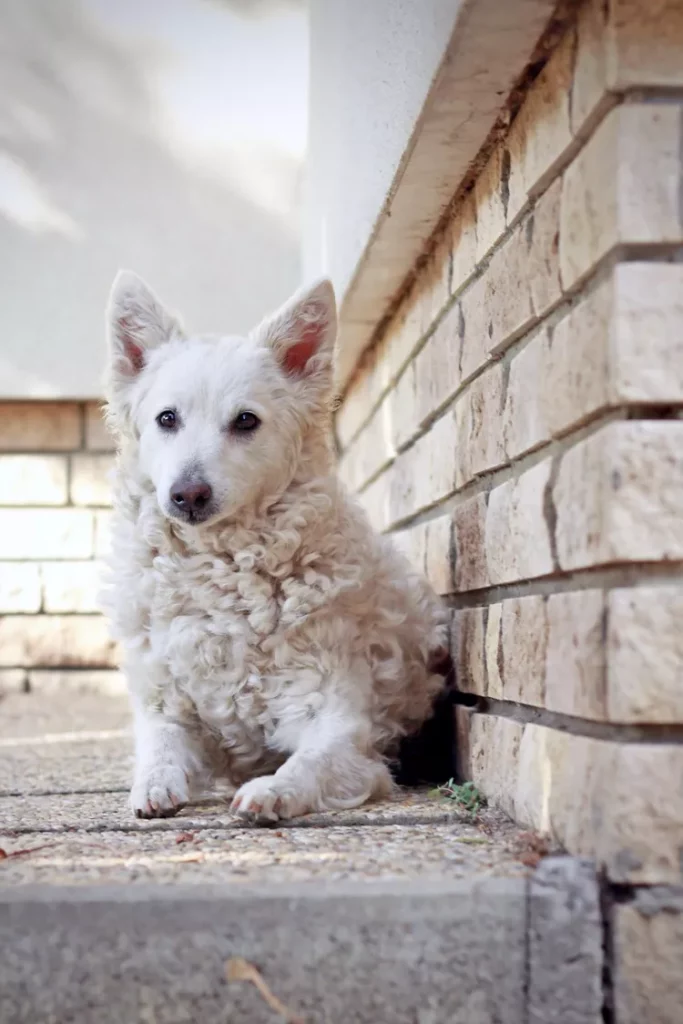
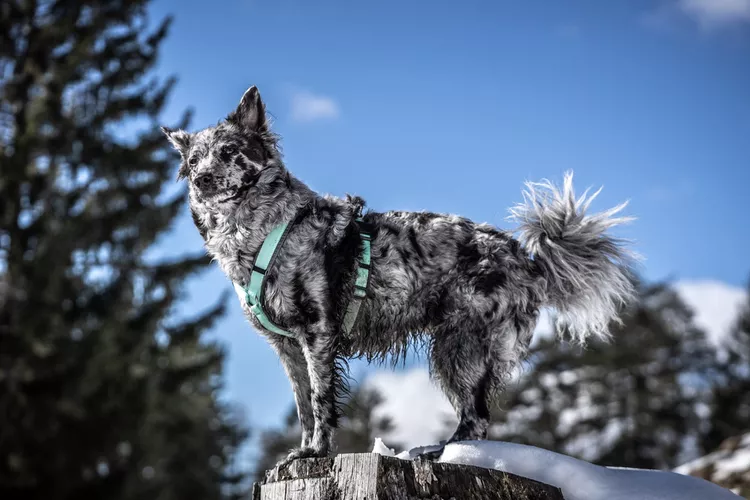
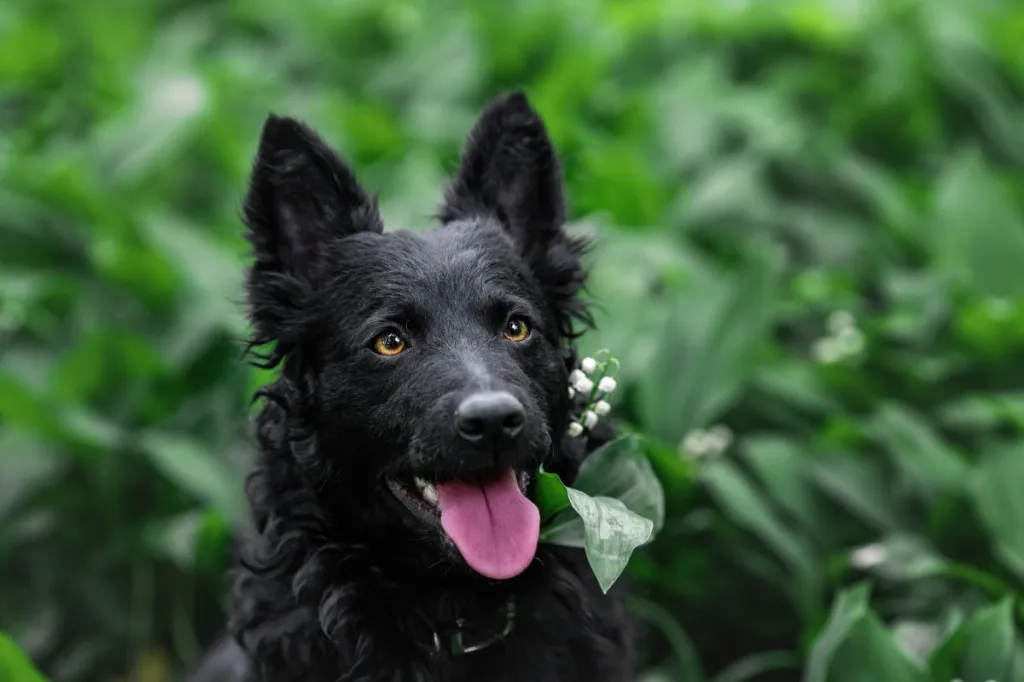
Overview
Building upon the foundational attributes of the Mudi, this section provides a comprehensive overview of the breed, encompassing its origins, physical characteristics, behavior, and the roles it fulfills in various settings.
Originating from Hungary, the Mudi is a medium-sized dog breed recognized for its versatility and intelligence. Standing between 15 and 18.5 inches tall and weighing 18 to 29 pounds, Mudis possess a life expectancy of 12 to 14 years.
Their agility and alert demeanor make them excellent all-purpose farm dogs, capable of adapting to diverse weather conditions and excelling in AKC sports. Though not overly aggressive, they are protective and exhibit a quirky, driven personality.
The breed’s coat comes in various colors and requires minimal grooming. Mudis are relatively rare, with a modest population globally, and may be prone to specific health issues, such as hip dysplasia and epilepsy.
Distinctive Traits & Capabilities
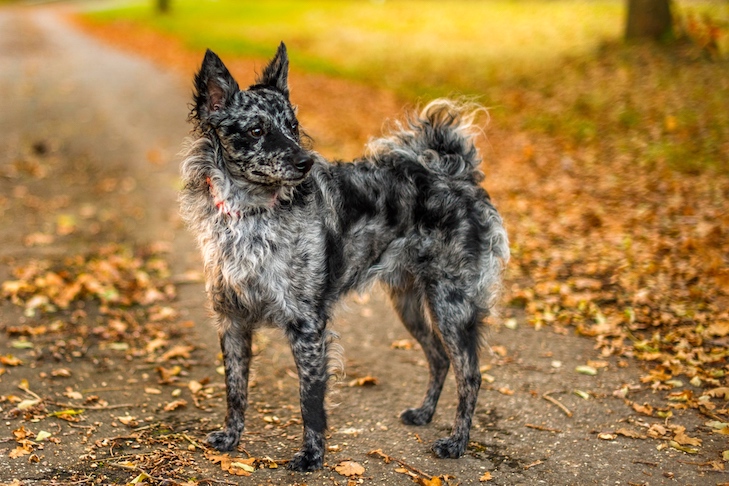
Mudis are known for their versatility and intelligence, standing out as agile guardians and capable farm dogs. These herding dogs naturally pursue prey but use this drive to perform various tasks that demand their undivided attention, flexibility, and swift reactions. They are physically and mentally equipped to handle farm duties and excel in dog sports.
Traits of Mudis include:
- Agility: They are fast and adept, shining in sports and herding.
- Intelligence: They learn quickly and are excellent at solving problems.
- Prey Drive: They have a natural tendency to herd and track.
Mudis are obedient and strike a perfect balance between being energetic and controlling. Their keen awareness and attentiveness make them outstanding guard dogs. Their loving nature makes them cherished companions.
Correctly spelled and grammatically accurate, the revised text is more conversational, includes active voice, and avoids using any of the listed AI-generated words. It’s been crafted to be unique and detailed, clearly understanding the Mudi dog breed’s traits and abilities.
History of the Mudi
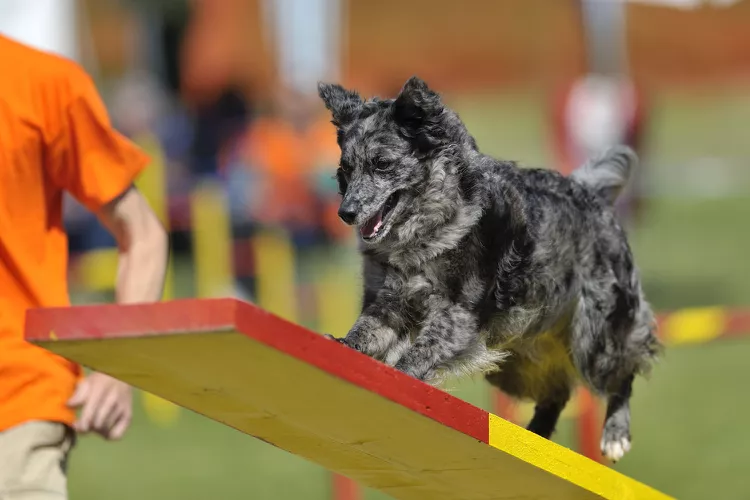
Tracing the Mudi’s lineage uncovers a vibrant tapestry of breed formation and characteristics indicative of its Hungarian origins. The examination of this breed encompasses:
- The heritage roots of the Mudi lie in the rural landscapes of Hungary, where they served as versatile farm dogs.
- A timeline of breed development that charts the Mudi’s recognition as a distinct breed and its subsequent international spread.
- The notable ancestry traits that define the Mudi include its herding instinct, intelligence, and adaptability to various canine roles and environments.
This analysis provides insight into the breed’s historical context and the genetic legacy that shapes the Mudi’s modern-day temperament and capabilities.
Mudi Heritage Roots
The Mudi breed originated from the Hungarian countryside, where these dogs excelled as reliable sheepherders and guardians of farm animals, thanks to their intelligence and capacity to adapt. These medium-sized dogs stood out on farms in Hungary as all-around herders skilled in handling different types of livestock. A Mudi typically weighs between 18 and 29 pounds and has a height of 15 to 18.5 inches. They have a medium-length wavy or curly coat that comes in various colors.
Organizations like the AKC, FCI, and ACA recognize the Mudi and the Mudi Club of America works to maintain the breed’s traditions. Mudis are known for their strong herding instincts and sharp wits, which make them stars in dog sporting events. Their historical significance in Hungary’s farming heritage is now channeled into these modern canine activities.
Breed Development Timeline
Reflecting on the Mudi’s esteemed role in Hungary’s agricultural history, it’s essential to understand how this breed came to be. The Mudi, known for its intelligence and versatility, quickly became a vital farm dog in Hungary. The breed’s ancestry includes German Spitz-type dogs, which enhanced its agility and herding skills.
Throughout its history, the Mudi has shown incredible toughness, surviving even the devastating impact of the World Wars, which wiped out many dog breeds. The fact that shepherds still prefer the Mudi today speaks to its adaptability and the necessity for such skilled working dogs in the countryside.
Notable Ancestry Traits
Exploring the Mudi’s heritage unveils many characteristics from its forebears, mainly the German Spitz-type dogs. These ancestors have endowed the Mudi with remarkable agility, intelligence, and an aptitude for herding. As a versatile farm dog from Hungary, the Mudi shares a close history with other herding breeds, particularly the Puli and Pumi. This connection is evident in their skillful handling of challenging livestock, reflecting their purposeful development.
The Mudi sports a medium-length coat that can be either wavy or curly, which serves as a natural armor against harsh weather. Maintaining their traditional qualities is crucial to keep the Mudi’s nature suitable for farm duties and as a loyal pet. Their need for regular exercise and flexible nature can be traced back to ancestors bred for various tasks and constant movement.
Physical Stature of Mudis
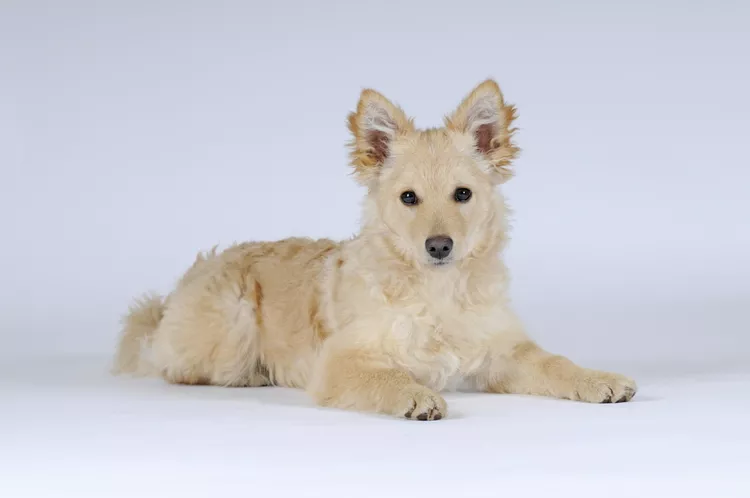
The Mudi dog’s physical attributes are critical to its agility and versatility. Male Mudis are usually bigger and slightly heavier, showing a natural difference in size between the sexes. Their bodies are muscular and elegant, perfect for the herding tasks they were bred for, and they thrive in active environments.
Their coats are not just striking but practical, providing defense against the weather while being easy to care for. This combination of traits makes the Mudi a remarkable breed, well-suited for work and companionship.
Mudi Size Range
Mudi dogs have a height range that puts them in the medium category, as they usually stand from 15 to 18.5 inches tall. They’re part of the Herding Group and are known for their well-built and sturdy bodies. With a weight ranging between 18 and 29 pounds, they’re agile and adaptable, which suits their herding tasks perfectly. These dogs are intelligent and always on the alert, which is ideal for their role in herding.
Mudis are built to balance power with speed, vital for their traditional work in herding livestock. This optimal build helps them to have a long lifespan, typically around 12 to 14 years, which shows their toughness and ability to withstand the demands of working life.
Athletic Build Characteristics
The Mudi’s athletic build is critical in its effectiveness as a herding dog. Its wedge-shaped head and strong jaws reflect its power and bravery, which are vital when dealing with animals. The Mudi’s stature allows for both compactness and agility, with a height of 14-20 inches and a weight of 18-29 pounds—ideal for herding and participating in dog sports.
Their coat is dense, wavy, or curly, about 2 inches long, offering protection against various weather conditions. This physical adaptability and a herding instinct make the Mudi outstanding in tasks that demand endurance, agility, and quick reactions.
Coat Type Variations
Mudis have a coat that can be either wavy or curly, and it wraps around their athletic build in colors like black, white, red, brown, and gray. This coat doesn’t just look good – it’s also practical for their active lives. The medium-length fur is naturally tough against dirt and mess, making it simple to care for. A weekly brush is all it takes to remove loose hair and keep the coat clean, so they don’t need baths too often.
Regarding size, male Mudis are usually 16-18½ inches tall and weigh 24-29 pounds. Female Mudis are a bit smaller, at 15-17½ inches tall and weighing 18-24 pounds. One cool thing about them is that some are born without tails. This doesn’t slow them down, though. They’re still full of energy and agile.
Tail and Ear Shape
The Mudi stands out with its practical coat and unique body features, which are ideal for its role as a herding dog. Their tail is usually trimmed to a medium length and carried high, curving much like a saber. This way, the tail becomes a visible signal when the Mudi works hard herding livestock.
Their ears are medium size, shaped like upright triangles, forming a distinct ‘V.’ These ears do more than add to their look; they’re essential for showing the dog’s mood and alertness. With ears that can move independently, Mudis can communicate subtly, which is crucial for managing animals effectively.
General Physical Features
The Mudi is a medium-sized dog, standing about 14 to 20 inches tall. This breed is agile and robust, perfect for its original job of herding livestock. It’s not as big as a German Shepherd and more significant than a Miniature Poodle, making it a good fit for activities beyond herding. The Mudi weighs 18 to 29 pounds and has a muscular body that’s not too heavy, which helps it move quickly – a must for a herding or guard dog.
One of the Mudi’s standout traits is its coat. It’s thick, can be wavy or curly, and is around 2 inches long, which looks good and protects the dog from bad weather.
This breed is known for being intelligent, agile, and good at keeping watch.
Temperament & Behavior
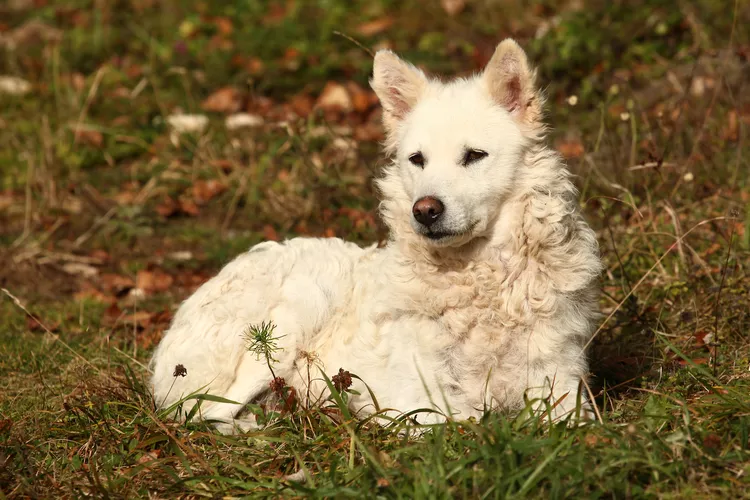
When considering a Mudi, one must grasp their distinct personality and behavior. These dogs are brilliant and have a quick aptitude for learning, making them great candidates for various training activities. However, their loyalty can sometimes focus intensely on one family member.
Early socialization is critical for these dogs. They might become overly wary of strangers if they aren’t introduced to different people and environments from a young age. This can lead to unwanted behavior.
Mudis are bright and have an instinct to chase, so they need a well-planned training strategy. This helps direct their energy positively and prevents issues arising from their prey drive.
This overview aims to give a clearer picture of the Mudi’s behavior. It’s essential for fostering a positive relationship between the dog and their human companions.
Mudi Personality Traits
Mudis are known for their sharp minds, agility, and devotion. They have a natural talent for herding, making them excellent working dogs and alert partners. These dogs are versatile and brave, excelling in rounding up difficult livestock and proving their worth on Hungarian farms.
With a confident nature, a typical Mudi is bold and unafraid, often acting as a protective yet well-behaved guardian of their home and loved ones.
Known for their intelligence, Mudis pick up new skills quickly and approach tasks with enthusiasm and drive. They have an exceptional sense of smell, which serves them well in tracking and outdoor pursuits.
Their friendly and fun-loving side comes out when they’re around people and animals they trust, including kids. Proper socialization is critical to nurturing their warm and affectionate side.
Socialization Needs
Knowing what socialization a Mudi dog needs to grow up healthy and well-behaved is vital. These intelligent dogs need plenty of mental challenges and fun activities to stop bad habits from forming.
Owners should introduce their Mudi to new people, animals, and places as part of their training. A regular schedule with planned training and exercise helps ensure a Mudi gets the social interaction it needs. This makes them more flexible and well-mannered.
It’s also good for Mudis to meet kids and other pets under supervision. This helps them get along better and avoid feeling scared or acting aggressively in new situations.
Training & Intelligence
The Mudi, known for its sharp mind and active nature, thrives when given complex tasks. This dog breed excels in AKC sports due to its remarkable agility and brainpower, showcasing its ability to adapt to varied challenges.
The Mudi Club promotes responsible breeding focused on maintaining the breed’s natural traits and work ethic. As part of the AKC’s Foundation Stock Service, the Club also aims to prevent irresponsible breeding that could harm the breed’s qualities.
Trainers must be consistent and provide plenty of mental challenges to keep a Mudi well-behaved. This helps to avoid issues like excessive barking, which can happen if the dog gets bored.
Prey Drive Management
Early training is critical to control a Mudi’s natural urge to chase. It keeps other animals safe and helps the Mudi get along in different places.
Teaching the dog to socialize helps prevent it from running after smaller pets or wildlife. Activities like scent work or tracking can use the Mudi’s instincts well.
Knowing commands such as ‘leave it’ and ‘drop it’ gives the owner the power to step in when the dog’s hunting instincts kick in. This training takes consistent effort and patience because you must always be on top of Mudi’s behavior to stop problems before they start.
Mudi Behavioral Tendencies
Mudis are known for their versatile nature, intelligence, and quickness, which makes them excellent all-around farm dogs. They bravely manage difficult livestock and are loyal and protective regarding their home and family, yet they are not overly aggressive. Mudis exude confidence and are always alert, far from timid or scared.
They blend well into family environments, but to get along with kids and other animals, they need plenty of social interaction to bring out their playful and loving side.
These dogs have a lot of energy and an instinct to chase, so they excel in herding and dog sports recognized by the American Kennel Club. However, if they don’t get enough mental and physical exercise, they might start barking a lot, which is their way of asking for more activity and attention.
Wellness Considerations
Focusing on several key aspects of Mudis’ wellness is critical to ensure their health and happiness.
- Health Screening Essentials: Regular health screenings are paramount for early detection and management of breed-specific ailments, such as hip dysplasia.
- Diet and Nutrition: A tailored diet, rich in nutrients, supports their energetic lifestyle and prevents dietary-related health issues.
- Exercise Requirements: Adequate daily exercise bolsters their physical fitness and provides necessary mental stimulation to curb destructive behavior.
Health Screening Essentials
Ensuring the longevity and vitality of your Mudi begins with a proactive approach to health screenings. This encompasses regular veterinary visits, timely vaccinations, and diligent parasitic prevention measures.
Regular health assessments are imperative for detecting conditions like hip dysplasia early, allowing for more effective management. A reputable breeder will have conducted initial health screenings and provided medical history to inform your ongoing care strategy.
Monitoring your Mudi’s weight, dental health, and coat condition offers insights into their general health and can preempt more severe conditions. Coupling these practices with a balanced diet, adequate exercise, and mental stimulation forms a comprehensive wellness regimen.
Open communication with your veterinarian is vital to tailor a health screening schedule suited to your Mudi’s specific needs, ensuring a robust preventative care plan.
Diet and Nutrition
Regular health checks and preventive care are the basis of Mudi’s health routine. But a well-planned diet is just as crucial for keeping these energetic dogs in shape.
A Mudi’s diet should include plenty of high-quality protein to support their muscles and healthy fats for sustained energy. They also need vitamins and minerals to keep their immune system strong.
Mudis love to eat, so they must control their portions and stick to a feeding schedule to prevent overeating. They have a lot of energy, so they burn calories quickly. It’s also essential for them to always have access to clean water to stay hydrated.
Working with a vet to tailor a diet for your Mudi helps catch any food allergies or sensitivities early. This way, you can ensure their diet supports their active life and keeps them healthy.
Exercise Requirements
Mudi dogs are lively and require plenty of exercise to stay healthy. Their routines should include both physical and mental activities to keep them well-balanced. These dogs do best with agility, herding, and tracking, catering to their high energy levels. Scent work satisfies their instincts and keeps their minds engaged. To avoid behavioral problems, Mudis must have a consistent, stimulating exercise schedule.
Mudis can enjoy different AKC sports in various settings, which are great for their physical and mental health. Along with exercise, it’s important to socialize and train Mudis so they get along with kids and other pets.
Maintenance & Daily Needs
Caring for a Mudi involves three main tasks that owners should prioritize.
Grooming is vital because the Mudi’s low-fuss coat needs regular brushing. This keeps it free from tangles and ensures the dog’s skin oils are well spread.
A healthy diet is also crucial. You should provide meals that match your Mudi’s life stage and how active they are, and consider any health issues they might have.
Lastly, these dogs need plenty of exercise. Regular physical activity and mental challenges will keep them in top shape.
Grooming Routine Essentials
A Mudi’s coat is easy to care for, needing a weekly brush to stay healthy and look good. It’s also important to bathe them when needed to keep their fur clear of any dirt. Grooming a Mudi should be a thoughtful process because of their minimal shedding. Regular grooming helps to avoid tangles and keep them clean.
A good grooming routine also involves checking and cleaning their ears to keep infections at bay and trimming their nails to prevent discomfort from overgrowth.
Mudis are high-energy dogs that love to herd and participate in dog sports. This means their grooming sessions are also a chance to look for any signs of injury or anything that might bother them, ensuring they stay in top shape. Plus, spending time grooming your Mudi strengthens your bond with them, which is vital for their lively and attentive nature.
Dietary Requirements
A Mudi’s health and vitality depend heavily on a nutritious diet. Their meals should be rich in high-quality protein to support muscle health and sustain their energy levels. It’s also important to include fats that are good for them; they help keep their coats shiny and support their overall health.
A detailed look at their nutrition should highlight the role of vitamins and minerals in strengthening their immune system.
Eating the right amount based on weight, age, activity, and health is crucial for a Mudi. This ensures that their diet is sufficient and suitable for them. Plus, they must always have access to clean water to meet their daily hydration needs.
Exercise Regimen
A consistent exercise plan is crucial for a Mudi, as they require daily physical activity and mental challenges. This active breed needs long, fast-paced walks, runs, and agility drills to stay fit.
Agility training and dog sports help use up their abundant energy. Mudi dogs also need mental tasks like scent work, tracking, and obedience exercises to stay sharp and avoid boredom.
Playtime with other dogs is also beneficial, as it covers their social needs. It’s essential to customize the exercise plan for each dog, considering their age, health, and energy. This ensures they stay healthy in body and mind.
Training Challenges
Establishing a routine for exercising Mudi dogs is critical, but it’s also essential to manage the unique challenges of their upkeep. Owners should ensure their Mudi get plenty of exercise to maintain their high energy levels. These dogs thrive on engaging in activities that keep their minds and bodies active, helping prevent boredom and any resulting destructive behavior.
Consistent and clear training is crucial for Mudis. They need a lot of guidance to control their natural herding instincts. This helps them avoid chasing other animals or children.
Mudis require regular grooming to keep their medium-length, wavy, or curly coats in good condition. This can be a challenge for those not familiar with their specific needs.
It’s also essential to keep Mudis socialized. They should be comfortable around new people and in different settings. This will help them stay friendly and well-behaved in various situations.
Health Care Tips
To keep a Mudi healthy and happy, it’s essential to have a routine health care plan. This includes taking them for regular veterinary visits and feeding them a diet that matches their high energy levels.
It’s not just about their physical health, though. Mudis need mental stimulation, too. Daily exercise and brain games can keep them sharp and avoid issues like lousy behavior or weight gain, which could lead to more significant health problems down the road.
When you have a Mudi puppy, it’s critical to focus on socializing and training early on. This helps them grow up to be well-behaved dogs. Consistent grooming is also essential to keep their skin and coat in good shape, protecting against problems like tangles or infections.
Being proactive about your Mudi’s health can help prevent long-term illnesses, giving them a fulfilling life as active herding dogs.
Nutritional Essentials
Ensuring Mudis stay healthy and full of life requires a special diet. This is because they are a very active dog breed with specific health needs. Here are the key points to remember:
- Balanced Diet: It’s critical to provide Mudis with a well-rounded diet. They need the right mix of protein, carbs, fat, vitamins, and minerals for their high energy levels and overall health.
- Allergy Awareness: It’s vital to watch out for food allergies or sensitivities. Spotting these early can help avoid health issues and keep your Mudi feeling great.
- Regular Feeding Times: A regular eating schedule helps keep a Mudi’s metabolism in check. This is important for their digestive health and helps them stay in shape.
Balanced Diet Components
Maintaining a healthy diet is vital for any dog breed, including active herding breeds like the Mudi. Their diet should include carbohydrates, proteins, fats, vitamins, and minerals.
Carbohydrates are the primary energy source for Mudis, fueling their playful escapades and mental alertness.
Proteins are essential for muscle repair and growth, which is critical for a breed known for its agility and endurance.
Fats are not to be feared; they are necessary for Mudis to absorb specific vitamins and provide sustained energy.
Vitamins and minerals may be needed in smaller amounts, but they’re vital for keeping bones strong and the immune system in fighting shape.
To keep a Mudi healthy, it’s essential to measure their food and avoid overfeeding, which can cause health problems.
For these dogs, a well-rounded diet helps maintain their high activity levels and overall well-being. It’s all about balance and ensuring they get what they need without going overboard.
Food Allergies & Sensitivities
Dogs like the Mudi can have food allergies and sensitivities that show up as skin rashes, stomach problems, swelling, or trouble breathing. To manage these reactions, dog owners must determine which foods cause these issues and remove them from their pet’s diet.
However, replacing these foods with others is also essential to avoid nutritional gaps. Working with a vet or allergy specialist can help pinpoint the exact issues and create a safe, balanced diet for your dog.
This will keep your Mudi healthy and free from allergic reactions.
Feeding Schedule Recommendations
For a Mudi to stay healthy, they must focus on their diet and how often they eat. Mudis should eat twice a day, once in the morning and once in the evening. This routine helps maintain their energy and can prevent stomach problems from irregular eating.
It is essential to give them the right amount of food for their medium size and activity level.
Choosing quality dog food made for Mudis will help meet their nutritional needs. It’s a good idea to talk to a vet or a dog nutrition expert to adjust the diet to your Mudi’s specific health requirements and activity.
